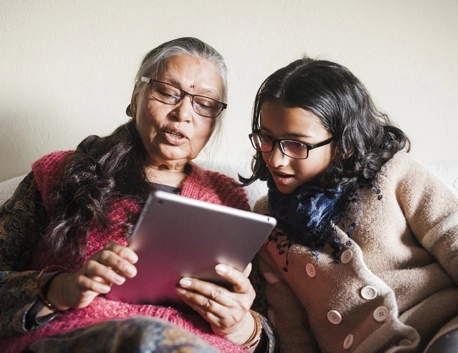You can learn more about what your loved one is going through and how you can help them. We have information and other resources for every part of this journey.

A visit to the doctor can feel scary or confusing. It can be especially hard for someone with memory problems. Getting ready ahead of time can help you and your loved one. Think about what you want to say and what you want to ask. This will help the doctor understand your loved one’s symptoms. Then, they can give you and your loved one the information you need to know.

If you’ve noticed a family member or loved one beginning to show signs of memory loss, changes in behavior, or other symptoms, you might be unsure of how to address it with them. But the time to have the conversation is now, and we have a few tips to make it easier.

Taking care of a loved one with Alzheimer’s can be hard for your body, your mind, and your emotions. Learning more and getting ready ahead of time can make a big difference. There are several things you can do to make sure you’re taking care of the needs of your loved one and your own needs.

A diagnosis of Alzheimer’s disease can bring many difficult emotions for your entire family. Learning how to support each other can help everyone get ready for the road ahead.

UsAgainstAlzheimer’s helps connect those who care for people with Alzheimer’s to resources to provide their best care, while also meeting their own needs.
Healthy choices like diet, rest and exercise are even more important for people with Alzheimer’s. Here are some activities to help you and your loved one take the right next steps.

Healthy food makes a big difference for brain health. Find out the right foods for healthy aging, learn how to find them on a budget, and try some sample menus.

Staying fit helps keep the brain healthy. Learn how to make an exercise plan that is right for you or your loved one.

Sleep helps reduce the buildup of proteins associated with Alzheimer’s disease. It also helps keep the immune system healthy. Learn more about the link between Alzheimer’s and sleep, and what you and your loved one can do.

Staying in touch helps keep the brain healthy. Research shows that talking to people and spending time with friends and family can slow rates of memory problems. Learn how you can help your loved one to get these benefits.
Alzheimer’s will cause changes and symptoms for your loved one. You can learn more and get ready for what’s next. Getting ready early can make a big difference.

Alzheimer’s is different for each person. But millions of people and families are going through the same kinds of changes and problems. Find out tips for taking care of someone with Alzheimer’s.

A clinical trial is research to test new medicines, diagnostics, care, or risk reduction programs. If your loved one joins a clinical trial, they may get to use new medicines, testing, care, or risk reduction programs. These trials also help move us all towards better care and treatment for Alzheimer’s.

Learning about the stages of Alzheimer’s can help you take care of your loved one. This will help you know what to expect, get ready ahead of time, and make a plan.
You do not have to take care of your loved one by yourself. Find outmore about nearby resources and groups that can help you.

Nearby resources can be very helpful for families that are dealing with Alzheimer’s. These community or faith-based groups may best understand and take care of the specific needs of your family.

Taking care of a loved one can be hard and tiring. There are groups that will help you get a break when you need one. This is called “respite care.” It can help you rest and refocus to take better care of your family member over the long term.

















